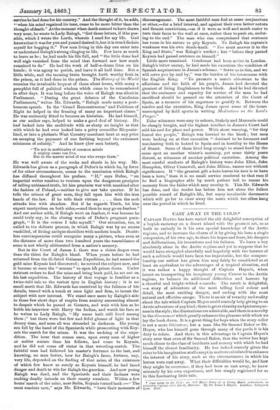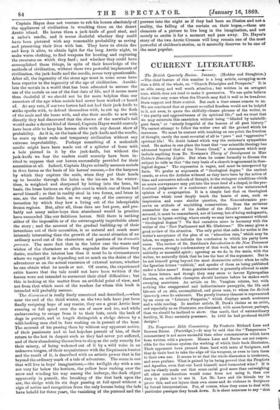CAST AWAY IN THE COLD.* CAPTAIN HAYES has here varied
the old delightful conception of a boyish castaway on a desert island with the greatest art, so as both to embody in it his own special knowledge of the Arctic regions, and to increase the charm of it by giving his hero a single companion, of his own age, to share his hopes and fears, his dangers and deliberations, his inventions and his failures. To leave a boy absolutely alone in the Arctic regions and yet to suppose that he would have struggled cheerfully and hopefully with the horrors of such a solitude would have been too improbable, but the companionship our author has given him may fairly be considered as at least an equivalent to the advantages of a tropical situation, and it was rather a happy thought of Captain Hayes's, when intent on transporting his imaginary young Crusoe to the Arctic regions, to balance its additional difficulties and horrors by a cheerful and bright-witted comrade. The result is delightful, —a story of adventure of the most telling local colour and detail, the most exciting danger, and ending with the most natural and effective escape. There is an air of veracity and reality about the tale which Captain Hayes could scarcely help giving to an Arctic adventure of any kind; there is great vivacity audpicturesque nessin the style; the illustrations are admirable, and there is a novelty in the denouement which greatly enhances the pleasure with which we lay the book down. It is a great thing for boys when the story-teller is not a mere litterateur, but a man like Sir Samuel Baker or Dr. Hayes, who has himself gone through many of the perils it is his duty to relate. And there is this advantage in Captain Hayes's story over that even of Sir Samuel Baker, that the writer has kept much closer to the class of incidents and scenery with which he had himself the closest familiarity. He has indeed scarcely given the reins to his imagination at all except in matters calculated to enhance the interest of his story, such as the circumstances in which his heroes were cast away. What their difficulties would be, and how they might be overcome, if they had been so cast away, he knew minutely by his own experience, and has simply registered for us in this fascinating little tale.
Captain Hayes does not venture to rob his heroes absolutely of the appliances of civilization in wrecking them on the desert Arctic island. He leaves them a jack-knife of good steel, and a sailor's needle, and it seems doubtful whether they could have been pictured with any reasonable probability as saving and preserving their lives with less. They have to obtain fire and keep it alive, to obtain light for the long Arctic night, to make warm clothing, to find weapons for hunting and capturing the creatures on which they feed ; and whether they could have accomplished these things, in spite of their knowledge of the methods of civilization, without those two powerful implements of civilization, the jack-knife and the needle, seems very questionable. After all, the ingenuity of the stone age must in some sense have been superior to the ingenuity of the age of civilization. Annihilate the metals in a world that has been educated to assume the use of the metals as one of the first data of life, and it seems more than doubtful if we should not be far more helpless than our ancestors of the age when metals had never been worked or heard of. At any rate, if our two heroes had not had their jack-knife to strike sparks with, to defend themselves with, to cut up the flesh of the seals and the bears with, and also their needle to sew with directly they had discovered that the sinews of the narwhal's tail would make a decent kind of thread, Captain Hayes would scarcely have been able to keep his heroes alive with any decent show of probability. As it is, on the basis of the jack-knife and the needle, he rears up their rude and temporary civilization without any extreme improbability. Perhaps something of a makeshift needle might have been made out of a splinter of bone with a hole pierced in it by the jack-knife, but without the jack-knife we fear the readers could scarcely have been invited to suppose that our heroes successfully provided for their necessities at all. Indeed, Captain Hayes actually assumes metals in three forms as the basis of his heroes' success,—for the harpoon by which they capture the seals, when they put their heads up to breathe through the holes in the ice-sea in the wintertime, is weighted and sharpened by letting into the bone, its basis, the brass buttons on the pilot-coat in which one of them had saved himself ; so that in reality steel in two forms, and brass in one, are the metallic basis, as we may say, of the currency of invention by which they hew a living out of the inhospitable frozen regions. But, after all, these data are but poor, and probably not many sailor-boys thus abandoned would in practice have succeeded like our fictitious heroes. Still there is nothing either of the impossible or of the extravagantly improbable about the story ; and the account of the gradual building-up of their inventions out of their necessities, is as natural and much more intensely interesting than the growth of the moral situation of an ordinary novel out of the characters and passions of its dramatis personae. The mere fact that in the latter case the wants and wishes of the characters so often engender the situations they desire, renders the interest less than it must be in circumstances where we regard it as depending not so much on the desire of the adventurer as on the actual resources of external nature, whether he can obtain what he needs or not. Of course, the experienced critic knows that the tale could not have been written if the heroes were not intended to surmount their chief difficulties; but this is looking at the matter from an artificial point of view, and not from that which most of the readers for whom this book is intended will probably assume.
The denouement is really finely conceived and described,—when near the end of the third winter, as the two lads have just been finally resigning hope of any rescue, they see a great Arctic bear running at full speed over the sea of snow and ice, and while endeavouring to escape from it to their huts, catch the bark of dogs in pursuit, and at length distinguish a sledge driven by a wild-looking man clad in furs rushing on in pursuit of the bear. The account of his passing them by without any apparent notice, of their passionate and at last hopeless pursuit of him, of their return to the hut in despair such as they had never yet suffered, and of their abandoning themselves to sleep as the only remedy for their misery, of being wakened out of it by a wild voice in an unknown tongue, of their acquaintance with the Esquimaux hunter and the result of it, is described with an artistic power that is far beyond the ordinary mark of a tale of adventure. The scene is one that will live in boys' imaginations,—the twilight sky with a sun not very far below the horizon, the yellow bear rushing over the snow and winding his way among the icebergs, the dark object apparently in pursuit, the breaking of the first bark upon the ear, the sledge with its six dogs passing at full speed without a sign of notice and recognition from the only human being the lads have beheld for three years, the vanishing of the pursued and the
pursuer into the night as if they had been an illusion and not-a reality, the falling of the curtain on their hopes,—these are elements of a picture to live long in the imagination, and no merely to excite it for a moment and pass away. Dr. Hayes's story of the two Arctic Crusoes will long remain one of the most powerful of children's stories, as it assuredly deserves to be one of the most popular.































 Previous page
Previous page